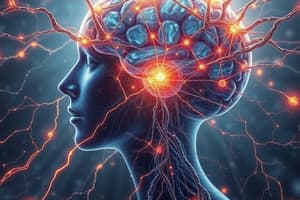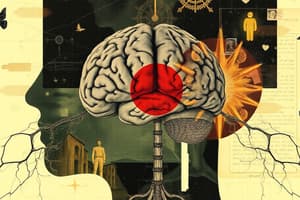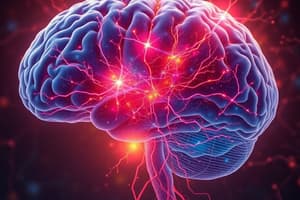Podcast
Questions and Answers
What does the biological approach to psychology investigate?
What does the biological approach to psychology investigate?
- Influence of cultural factors on behavior
- Relationships between physiology and behavior (correct)
- Impact of social interactions on mental processes
- Contributions of environmental conditions to mental health
Who are the four contributors to the biological approach?
Who are the four contributors to the biological approach?
Gazzaniga, Bouchard, Rosenzweig, and Sperry
List the three principles that define the biological level of analysis.
List the three principles that define the biological level of analysis.
- All behavior has a physiological basis. 2. Behavior may be influenced by evolutionary processes. 3. Animal studies provide insight into human behavior.
How does the case study of Phineas Gage help support the idea of localization of brain function?
How does the case study of Phineas Gage help support the idea of localization of brain function?
Explain genetic predisposition.
Explain genetic predisposition.
What were the methods, findings, and conclusion of the Gazzaniga experiment?
What were the methods, findings, and conclusion of the Gazzaniga experiment?
What are some examples of applications of the Split Brain study?
What are some examples of applications of the Split Brain study?
List at least one criticism of the Gazzaniga study.
List at least one criticism of the Gazzaniga study.
What is neurotransmission?
What is neurotransmission?
What is a neurotransmitter?
What is a neurotransmitter?
Provide examples of how neurotransmitters affect behavior.
Provide examples of how neurotransmitters affect behavior.
Describe the Martinez and Kesner (1999) study and its relation to neurotransmission.
Describe the Martinez and Kesner (1999) study and its relation to neurotransmission.
Describe the Kasamatsu & Hirai (1999) study and how the environment affects neurotransmission.
Describe the Kasamatsu & Hirai (1999) study and how the environment affects neurotransmission.
What is ablation and scarring? Are there ethical concerns associated with the methods?
What is ablation and scarring? Are there ethical concerns associated with the methods?
What is an EEG, and what are its applications, positives, and negatives?
What is an EEG, and what are its applications, positives, and negatives?
What is Positron Emission Tomography (PET)? What are its applications, positives, and negatives?
What is Positron Emission Tomography (PET)? What are its applications, positives, and negatives?
Flashcards are hidden until you start studying
Study Notes
Biological Approach to Psychology
- Explores the relationship between physiology, behavior, and mental processes.
- Emphasizes the roles of the central nervous system, peripheral nervous system, and autonomic nervous system.
- Investigates brain chemistry, body chemistry, and the endocrine system.
- Considers genetics and heredity in influencing behavior.
Contributors to Biological Psychology
- Significant figures include Gazzaniga, Bouchard, Rosenzweig, and Sperry.
Principles of Biological Level of Analysis
- All behaviors have a physiological basis and can be inherited.
- Evolutionary processes may influence behavior.
- Insights into human behavior can be gained from animal studies.
Phineas Gage Case Study
- Gage's traumatic brain injury changed part of his personality, supporting localization of brain function.
- Demonstrates that specific brain areas are responsible for distinct functions.
Genetic Pre-Disposition
- Based on family history, individuals may have a higher likelihood of developing specific psychological conditions.
Gazzaniga Experiment Findings
- Studied both human and non-human animals using visual, auditory, and tactile tests.
- Discovered that the brain's two hemispheres operate independently, each responsible for specific tasks (localization).
Applications of Split Brain Study
- Insights are applied in localization therapy.
Criticism of Gazzaniga Study
- Suggests no human activity utilizes only one side of the brain, questioning findings' applicability.
Neurotransmission Process
- Involves communication through neurotransmitters that send and receive messages, allowing responses to environmental and internal stimuli.
Role of Neurotransmitters
- Serotonin regulates sleep, appetite, temperature, pain, and mood.
- Dopamine is crucial for involuntary movements, learning, memory, and emotions.
- Acetylcholine is tied to cognitive functions such as memory and emotion.
- Noradrenaline affects heart rate, stress response, sleep, and emotion.
Martinez and Kesner (1999) Study
- Investigated the effect of acetylcholine on memory in rats.
- Rats with increased acetylcholine showed enhanced memory and navigated mazes more quickly.
Kasamatsu & Hirai (1999) Study
- Explored the effects of environmental sensory deprivation on neurotransmission.
- Buddhist monks' fasting led to hallucinations due to increased serotonin levels, activating the hypothalamus and frontal cortex.
Ablation and Scarring
- Ablation (removal) and lesioning (scarring) are methods to study behavioral changes by manipulating brain tissue.
- Ethical concerns arise due to irreversibility and potential harm to participants.
EEG (Electroencephalogram)
- Measures electrical activity in the brain to understand sleep, emotions, and epilepsy.
- Limitations include inability to access deeper brain regions and functional analysis.
PET (Positron Emission Tomography)
- Monitors glucose metabolism in the brain using radioactive glucose injections.
- Produces colored maps of brain activity but has limitations in detail and depth of information.
Studying That Suits You
Use AI to generate personalized quizzes and flashcards to suit your learning preferences.




